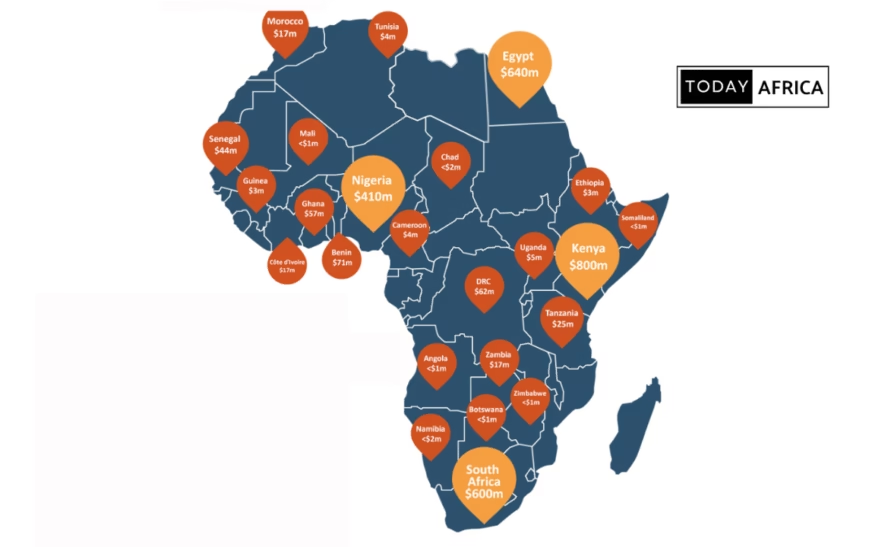Angel investors play a crucial role in the startup ecosystem — providing early-stage funding and essential mentorship to entrepreneurs.
As an African entrepreneur, accessing angel investment can be a game-changer in driving business growth and overcoming financial hurdles. But how exactly can you get these investors?
You can get angel investors for your startup by researching angel investor networks, attending pitch events and conferences, tapping into business networks, and being proactive on social media.
Then, you can pitch your business to them and secure the valuable funding it needs.
In this article, you’ll discover 14 angel investors in Africa, learn about the major trends shaping the ecosystem, and how to attract and engage these investors.
How exactly does angel investment work in Africa?
Angel investors are high-net-worth (HNI) individuals who invest their personal funds in early-stage startups in exchange for equity or convertible debt. Unlike venture capitalists (VCs), they typically invest small amounts and are more willing to take on higher risks.
With equity investment, angel investors usually negotiate a percentage of ownership in the startup. This ownership stake grants them a say in important decisions and a share of future profits.
Conversely, convertible debt allows angels to provide a loan that converts into equity when triggered by specific events, like a subsequent funding round or an exit.
Still, angel investments can vary significantly — from a couple of thousand dollars to a few million.
In Africa, where traditional lending institutions may be less accessible, angel investors have emerged as a vital source of capital for entrepreneurs. They provide financial backing and offer invaluable expertise and industry insights.
However, African angel investors also typically have a deep understanding of local markets and are passionate about supporting indigenous startups that align with their interests.
Their involvement can bring vital resources, expertise, and networks to entrepreneurs like you — helping them navigate the challenges unique to the African business landscape.
Overlooked opportunities for attracting angel investors in Africa
While angel investors play a crucial role in the African startup ecosystem, founders often overlook certain opportunities to attract attention to their startups.
Here are some key opportunities for finding angel investors in Africa:
- Build rural and impact-focused startups: Investors are starting to recognize the potential of startups that address unique challenges in rural areas or have strong social impact objectives. Highlighting these aspects can pique the interest of angel investors.
- Seek out diaspora angel investors: You can tap into the diaspora community’s vast network of potential angel investors. Diaspora angels often possess a deep understanding of African markets and a commitment to supporting the continent’s entrepreneurial ecosystem.
- Connect with women angel investors: While female representation in angel investing is still limited, their numbers are growing. Seeking out women angel investors can diversify your funding sources and help you tap into a base that is passionate about supporting women-led businesses.
- Explore local corporate angel investors: Corporations seeking to expand their innovation ecosystems may act as angel investors, providing funding and mentorship to startups. Research corporate venture arms or innovation programs that align with your business.
By exploring these overlooked opportunities, you can broaden your pool of potential angel investors and increase your chances of securing funding.
Read Also: The Ultimate Startup Checklist for African Founders
14 angel investors in Africa funding startups
1. Esther Dyson
Esther Dyson is a Swiss‑born American investor and long‑time technology commentator whose early‑career focus on healthcare and IT gave way to a passion for emerging‑market innovation.
After decades of spotting disruptive business models in Silicon Valley, she turned her attention to Africa around 2018, drawn by the combination of rapid demographic growth and deep infrastructure gaps.
Dyson’s philosophy centers on “catalytic capital”—she seeks out ventures that not only address urgent community needs but can also scale broadly through smart partnerships and repeatable operations.
Her approach combines hands‑on mentorship with introductions to global networks, helping founders navigate everything from regulatory hurdles to talent recruitment.
Key investments and impact
- Angaza: Angaza’s pay‑as‑you‑go solar platform brings clean energy to off‑grid homes by empowering distributors with flexible financing. Dyson led a seed round that enabled Angaza to pilot in Tanzania and Kenya, where solar‑powered lanterns and home systems now reach tens of thousands of households, reducing reliance on kerosene and improving study conditions for children.
- Nomanini: Nomanini equips informal sector retailers—corner shops and market stalls—with mobile point‑of‑sale devices and micro‑credit access. Dyson’s investment helped Nomanini expand its agent network from South Africa into Nigeria and Kenya, unlocking formal financial services for merchants who previously operated on cash‑only terms.
- Ilara Health: By subsidizing the roll‑out of Ilara Health’s cloud‑connected diagnostic machines, Dyson has accelerated access to point‑of‑care blood tests and ultrasound imaging in rural Kenyan clinics. This infusion of capital and expertise has lowered test costs by up to 50%, enabling earlier disease detection and better patient outcomes.
- Oradian & Trella.app: In partnership rounds, Dyson backed Oradian’s cloud‑based core banking system, which serves microfinance institutions across 20 African countries, and Trella.app, a logistics‑marketplace optimizing truck dispatch in Egypt and Morocco. Both investments reflect her conviction that bolstering financial infrastructure and supply chains lays the groundwork for continent‑wide economic growth.
2. Chris Adelsbach
Chris Adelsbach made his name as a tech executive in Silicon Valley before shifting to early‑stage investing focused on Africa’s dynamic startup scene. He emphasizes pre‑seed to seed rounds, looking for founders who combine local market insight with scalable technology.
Adelsbach often co‑invests alongside local funds to mitigate risk and deepen on‑the‑ground support, reinforcing his belief that outsider capital must be paired with insider experience.
Signature portfolio companies
- Kuda Bank: As a mobile‑only neobank, Kuda offers no‑fee transactions, automated savings, and instant loans. Adelsbach’s pre‑seed check helped Kuda grow from a hundred thousand to over five million users in under two years, establishing it as Nigeria’s fastest‑growing digital bank.
- OnePipe: OnePipe provides standardized APIs that enable fintech developers to plug into banking, payments, and alternative credit scoring services. Chris’s backing in 2020 fueled OnePipe’s expansion from Nigeria into Ghana and South Africa, where its integrations power lending apps and payroll platforms.
- Vendease & DoPay: Vendease digitizes the foodservice supply chain for restaurants and hotels with centralized procurement, while DoPay allows SMEs to collect payments and issue mobile salary payouts. Adelsbach’s seed investments helped both startups refine their product–market fit and secure subsequent Series A rounds.
3. Ryan Petersen
Ryan Petersen, founder and CEO of Flexport, applies his deep understanding of global supply chains to angel investing in Africa. He targets startups that bridge logistics inefficiencies with digital platforms, convinced that unlocking trade corridors will propel economic development.
Petersen’s value‑add goes beyond capital; he frequently connects portfolio companies with global shippers, freight forwarders, and technology partners.
Portfolio companies
- Lori Systems: Lori’s platform digitizes trucking operations across East Africa, matching shippers with vetted drivers. Petersen’s seed investment in 2019 enabled Lori to refine its route‑optimization algorithms and launch inter‑country services linking Kenya, Uganda, and Rwanda.
- TopShip & Sendbox: Focused on West Africa, both marketplaces reduce downtime and empty‑truck runs by connecting shipping customers to available carriers. Petersen’s backing helped standardize contracts and insurance offerings, increasing reliability for first‑time exporters.
- Powered by People: This social‑impact sourcing platform ensures that agricultural and artisanal goods from African cooperatives meet international compliance standards. Ryan facilitated pilot programs with major retailers in Europe, showcasing how transparent supply chains can open premium markets.
4. Justin Kan
Justin Kan, best known as Twitch’s co‑founder, extends his entrepreneurial prowess to African startups by backing ventures with high user engagement potential. He looks for business models that marry peer‑to‑peer networks with platform‑driven monetization, believing that the continent’s youthful population is primed for disruptive consumer and gig‑economy apps.
Investments
- Releaf: Releaf connects smallholder farmers to buyers through a mobile marketplace, providing real‑time pricing and financing options. Kan’s pre‑seed check jump‑started pilots in Nigeria’s cocoa regions, helping farmers double their incomes through direct sales and reduced post‑harvest waste.
- SafeBoda: A motorbike‑taxi and delivery service, SafeBoda integrates driver training and digital payments. Justin’s investment fueled expansion from Kampala into Nairobi and Lagos, where tens of thousands of drivers now earn more reliable daily wages.
- Anchor: Anchor provides affordable hosting and connectivity solutions for businesses and developers. Kan’s support helped Anchor roll out lower‑cost data plans and shared‑infrastructure offerings in South Africa and Kenya, enabling startups with limited budgets to scale their services.
5. Raffael Johnen
Raffael Johnen, CEO of German peer‑to‑peer lending platform Auxmoney, adapts European fintech best practices to African contexts. He seeks entrepreneurs who can localize proven business models—especially in credit scoring, digital lending, and financial literacy—and supports them through strategic advisement and cross‑border introductions.
Notable investment
- Kuda & Kippa: Both neobank‑style apps, Kuda targets consumers with no‑fee accounts and automated savings while Kippa offers bookkeeping and invoicing tools for small merchants. Raffael’s early backing helped these platforms refine their risk models and comply with central‑bank regulations in multiple jurisdictions.
6. Brandon Krieg & Ed Robinson
The stash duo’s collaborative approach. Brandon Krieg and Ed Robinson, founders of U.S. micro‑investing app Stash, co‑invest in African fintech seeds where consumer engagement and financial inclusion intersect. Their dual expertise in gamified savings and risk management shapes how they assess pitch decks, emphasizing UX design that drives habitual use.
Featured portfolio companies
- Casava Insurtech: Casava offers pay‑as‑you‑go crop and health insurance products tailored to smallholder farmers. Stash’s founders guided product‑market fit workshops, resulting in a 40% uptick in monthly policy subscriptions.
- Jerry: A last‑mile logistics platform serving gig drivers, Jerry leverages dynamic pricing and driver incentives. Krieg and Robinson introduced Jerry’s leadership to key U.S. delivery‑tech partners, accelerating feature development in route optimization and safety tracking.
7. Odunayo Eweniyi
Odunayo Eweniyi, co‑founder of savings app PiggyVest and the First Check Africa angel network, is renowned for advocating gender equity in startup ecosystems. She combines capital injections with founder bootcamps, promoting inclusive recruitment and board‑level diversity in her portfolio companies.
Impactful deals
- Norebase: Norebase streamlines legal‑tech services for SMEs—company registration, compliance filings, and contract drafting. Eweniyi’s seed funding underwrote the development of a user‑friendly dashboard that slashed onboarding times from weeks to days.
- Klas: An edtech marketplace connecting tutors with learners, Klas emphasizes female‑led instructor onboarding. Odunayo’s mentorship programs have helped the company double its qualified teacher pool, improving subject‑coverage breadth and student retention.
8. Sandeep Nailwal
As co‑founder of the Polygon blockchain network, Sandeep Nailwal channels resources into African projects exploring decentralized finance (DeFi) and digital assets. His thesis focuses on infrastructure plays—exchanges, wallets, and compliance tools—that lay the groundwork for broader crypto adoption on the continent.
Portfolio
- Nestcoin: A crypto exchange built for African users, Nestcoin integrates local‑currency on‑ramps and peer support channels. Nailwal’s seed capital funded compliance‑engineering hires and region‑specific UX research, leading to a seamless onboarding flow for first‑time traders.
- Xend Finance & Wicrypt: Xend offers DeFi yield farming and savings products, while Wicrypt enables peer‑to‑peer Wi‑Fi sharing with crypto micropayments. Sandeep’s guidance on tokenomics design and cross‑chain interoperability has been instrumental in both startups’ Series A preparations.
9. Shola Akinlade & Olugbenga “GB” Agboola
Shola Akinlade (Paystack) and GB Agboola (Flutterwave) exemplify “build here, invest here.” After steering their respective payment giants to unicorn status and acquisitions or IPO readiness, they’ve redirected capital and expertise into early‑stage fintech and community ventures, accelerating Nigeria’s digital‑finance renaissance.
Key investments
- EarniPay: A payroll‑as‑a‑service platform that enables on‑demand salary access. Akinlade and Agboola’s joint pre‑seed round brought payroll integrations with top HR systems and seeded partnerships with large FMCG employers.
- Afropolitan & Curacel: Afropolitan curates cultural‑commerce experiences, while Curacel provides claims‑management infrastructure for insurers. Their backers have shared go‑to‑market playbooks, helping these startups forge B2B relationships with banks and aggregators.
10. Charlie Delingpole
Charlie Delingpole, founder of UK‑based regtech firm ComplyAdvantage, zeroes in on compliance, KYC, and risk‑scoring solutions. He sees African fintech’s next frontier in robust fraud prevention and identity‑verification tools—critical enablers for sustainable scale.
Standout deals
- Finclusion Group: Delingpole’s seed investment helped Finclusion build a mobile‐first digital identity system, enabling banks to onboard customers remotely and reducing account‑opening costs by up to 60%.
- Stitch API: As a pan‑African financial data aggregator, Stitch provides secure account‑linking services. Charlie’s capital and network access facilitated strategic partnerships with regional banks and telecom operators.
11. Olumide Soyombo
Olumide Soyombo, co‑founder of Nigerian systems integrator Bluechip Technologies, has been an active angel investor since 2014. His insider perspective on local enterprise needs helps startups tailor products for the unique demands of West African corporates.
Signature investments
- Paystack & Moniepoint: Early checks in both payment‑processing pioneers contributed to infrastructure that now handles billions of dollars annually. Soyombo’s support went beyond funding, advising on regulatory compliance and banking partnerships.
- TeamApt, Lemonade Finance, AltSchool Africa: Spanning core banking, digital lending, and K‑12 edtech, these ventures benefited from his operational playbooks—particularly around localization, from language support to local‐payment rails.
12. Kola Aina
Kola Aina founded Ventures Platform, one of West Africa’s first full‑stack early‑stage funds, and Emerging Platforms, which incubates disruptive ideas across sectors. His dual roles as fund manager and mentor position him to back ventures with both financial runway and talent pipelines.
Portfolio powerhouses
- Thrive Agric: A farm‑to‑market agri‑tech platform that provides inputs, financing, and market access for smallholder farmers. Aina’s lead investment enabled Thrive Agric to scale to over 100,000 farmers, increasing yields by 30% on average.
- Paystack, Tizeti, MDaaS: Beyond payments (Paystack), his portfolio includes Tizeti’s solar‑powered broadband services and MDaaS’s telemedicine network—ventures that tackle Africa’s infrastructure deficits with technology‑driven solutions.
See Also: How to Legally Protect Your Startup Idea in Africa
How to find the right angel investors for your startup
Finding angel investors who are a good fit for your startup can significantly impact your chances of securing funding. Therefore, we recommend you be intentional when pitching your business.
Here are some excellent strategies for getting the right angel investors for your startup:
- Research angel investor networks. Look for local or regional angel investor networks that actively invest in startups. These networks often have thorough screening processes, ensuring they connect you with reputable investors.
- Attend pitch events and conferences. Participate in startup competitions, entrepreneurship conferences, and pitch events. These platforms provide opportunities to showcase your business and connect with potential investors.
- Tap into business networks. Leverage your existing networks, such as industry associations and business communities, to connect with potential angels. Networking events and mentorship programs can be valuable avenues for building relationships.
- Be proactive on social media. Use social media platforms, particularly LinkedIn and Twitter, to connect with angel investors. Engage in industry conversations, share your journey, and seek advice. Building an online presence can attract investors who resonate with your vision.
Remember, it’s not just about finding any angel investor — it’s about finding the right one.
You want an angel investor who speaks your language and believes in your business as much as you do. So, look for investors who align with your industry, have a strong track record, and share your passion for impact.
Angel investment vs venture capital: which does your startup need?
Both angel investment and venture capital are viable options for funding startups, but they differ in several key aspects. Understanding these differences will help determine which route best suits your business needs.
Angel investment is often more accessible for early-stage startups and provides a quicker path to funding. Additionally, angel investors are typically more hands-on and offer mentorship, networking opportunities, and industry expertise.
Venture capital, on the other hand, is more suitable for startups seeking larger funding rounds and rapid scaling. VCs bring substantial capital resources, industry connections, and experience in managing high-growth businesses.
Ultimately, the choice between angel investment and venture capital depends on your:
- Business stage
- Funding requirements
- Growth ambitions
Still, it’s not an “either/or” situation. You can pursue both options by seeking an angel investor in the very early stages of your business and then pursuing VC funding after you’ve gotten some traction. This way, your business will benefit from the hands-on nature of angel investing as well as the substantial capital of VCs.
See Also: Top 15 Grants for African Startups This Year
Conclusion
Angel investors in Africa are the unsung heroes behind the most promising startups. From fintech trailblazers to agritech innovators, these individuals profiled here exemplify strategic, impact‑driven capital deployment.
Whether you’re seeking mentorship, funding, or simply inspiration, understanding the approaches and portfolios of these top “Angel Investors in africa” can guide your own entrepreneurial journey.
Ready to take the next step? Start networking, refine your pitch, and explore how these investors’ theses align with your venture.
FAQ
What sectors are attracting the most angel investment in Africa?
Fintech, agritech, healthtech, cleantech, and edtech lead the pack, driven by massive market gaps and scalable digital solutions.
How do I approach an angel investor in Africa?
Research their investment thesis, find warm introductions via networks like Lagos Angel Network or First Check Africa, and craft a concise pitch deck highlighting traction and market potential.
What stage do angel investors typically fund?
Most angels invest at seed or pre‑seed stages, focusing on MVPs with initial user or revenue traction and a clear path to scale.
What is the difference between an angel investor and a venture capitalist?
Angel investors are typically high‑net‑worth individuals providing early capital and mentorship, while VCs manage pooled funds investing larger sums at later stages.
Leave a comment and follow us on social media for more tips:
- Facebook: Today Africa
- Instagram: Today Africa
- Twitter: Today Africa
- LinkedIn: Today Africa
- YouTube: Today Africa Studio
















